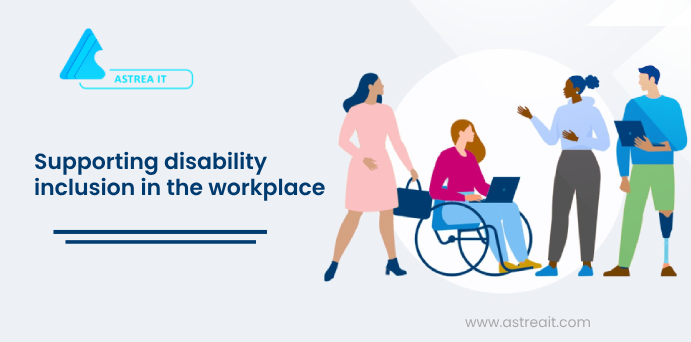Businesses and allies can take several proactive steps to support disability inclusion in the workplace:

1. Education and Awareness: Foster a culture of understanding and empathy by providing training on disability awareness and etiquette. This helps employees understand the challenges faced by individuals with disabilities and promotes a more inclusive environment.
2. Accessible Workplace: Ensure that the workplace is physically accessible to individuals with disabilities. This includes providing wheelchair ramps, accessible restrooms, and ergonomic workstations. Digital accessibility is also crucial, so websites, software, and communication tools should be designed with accessibility in mind.
3. Recruitment and Hiring Practices: Implement inclusive recruitment and hiring practices by actively seeking out candidates with disabilities. This can involve partnering with disability organizations, attending job fairs specifically for individuals with disabilities, and making reasonable accommodations during the hiring process.
4. Reasonable Accommodations: Be proactive in providing reasonable accommodations for employees with disabilities to ensure they can perform their job duties effectively. This might include providing assistive technologies, modifying work schedules, or making changes to the physical workspace.
5. Flexible Work Policies: Offer flexible work arrangements such as telecommuting, flexible hours, or part-time work options. This allows employees with disabilities to better manage their work-life balance and accommodate any medical appointments or treatments.
6. Employee Resource Groups (ERGs): Establish employee resource groups focused on disability inclusion. These groups provide a platform for employees to share experiences, offer support, and advocate for policy changes within the organization.
7. Mentorship and Career Development: Offer mentorship programs and career development opportunities specifically tailored to individuals with disabilities. This helps foster professional growth and advancement within the organization.
8. Leadership Commitment: Demonstrate leadership commitment to disability inclusion by allocating resources, setting measurable goals, and holding leaders accountable for progress. Leadership buy-in is essential for creating a truly inclusive workplace culture.
9. Promote Positive Language and Attitudes: Encourage the use of respectful and empowering language when referring to individuals with disabilities. Avoid stereotypes and stigmatizing language, and promote a culture of respect and acceptance.
10. Community Engagement: Engage with disability advocacy organizations and community groups to learn from their expertise and perspectives. This can help businesses stay informed about best practices and emerging trends in disability inclusion.
By taking these proactive steps, businesses and allies can create a more inclusive workplace where individuals with disabilities feel valued, respected, and empowered to contribute their full potential.
For any queries please reach out to support@astreait.com